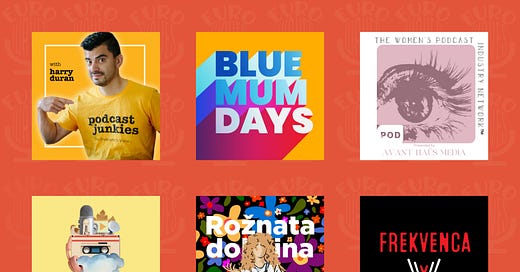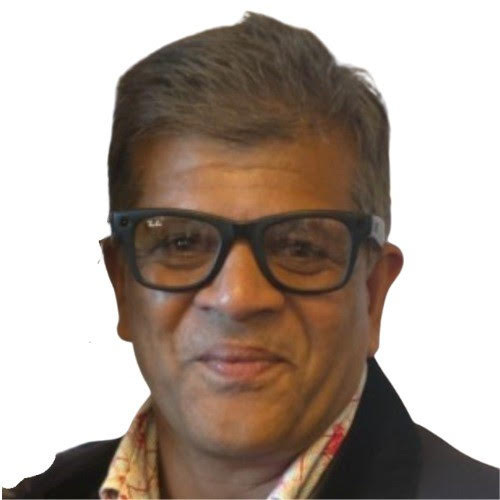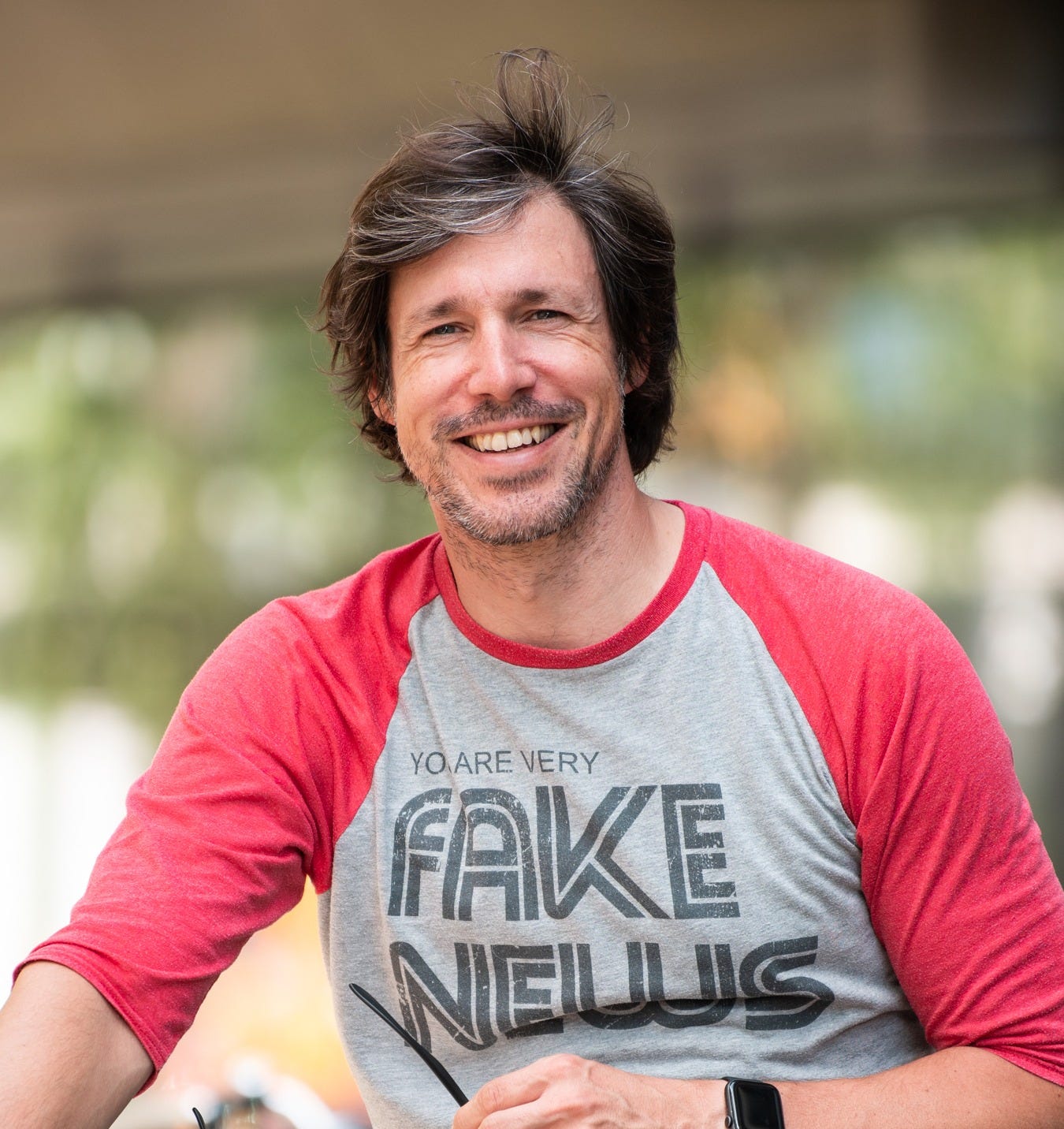Hey podcasters,
Popping up in your inbox on a Thursday this time, since tomorrow is the start of Easter weekend.
It’s the 10th issue of Eurowaves. Thank you for coming along on this ride, and here’s to many more! To celebrate the beginning of this community, I’d love it if you took one minute to...
Share this newsletter in your network or with a friend who wants to learn more about European podcasting!
I’ve been loving the conversation that started in the last issue about AI’s involvement in podcasting. So this time, I wanted to bring in someone who is leading that discussion in the industry. Sam Sethi of TrueFans and Podnews shares his insights and advice on how European podcasters can make the most of AI, which tools to explore, and how to reframe your mindset around new technologies. Below is just an excerpt. You can read the full interview here.
Before we get into it, I also want to share an observation about the European industry that’s been on my mind.
We all know that podcasting in the United States started with NPR. So there has been room from the beginning for impactful storytelling, narrative podcasts, and a variety of formats. Celebrity podcasts came later. If we look at Europe, especially Eastern Europe, which is where I am and what I know best, podcasting was more of a transition of radio personalities to YouTube. It’s video-first from the get-go. Toward the end of the newsletter, you’ll also find podcast recommendations from Matej Praprotnik in Slovenia, which, in contrast to my observations for Romania, are more radio-focused. I’d love to hear your thoughts on this.
In other words, what came first? The chicken (radio) or the egg (celebrities)?
Eurowaves Update ☘️
Since the last issue, we have…
…+13 new subscribers.
Please share with your network to keep the community growing!
If you are interested in advertising in Eurowaves, reply to this or email me at andreea.coscai@gmail.com.
🤖🎙️What should podcasters do when AI takes over?🎙️🤖 with Sam Sethi
Sam is the CEO of TrueFans, a Podcasting 3.0 app that enables fans to reward their favourite creators using micropayments. He is also the co-host of Podnews Weekly Review.
Sam is a 30 year veteran of the IT industry. He has held senior technical and marketing director roles across a number of companies including Microsoft, Netscape, Gateway Computers and Microstrategy. He has also been an entrepreneur having started and successfully sold three startups covering home-automation, fashion and journalism. Sam also helped start TechCrunch Europe and has been an angel investor and mentor to numerous startups.
Before entering the IT industry, Sam was an Army Officer in the Parachute Regiment and in his spare time enjoys teaching Krav Maga.
You can connect with Sam on LinkedIn and read the full interview here.
TLDR: “All the AI developments are exciting, though it will take a few months for everything to fully roll out. Try reframing AI in your mind as "Assisted Intelligence." Think of it as helping you, not replacing you.
AI transcription tools like Wondercraft know they can currently achieve around 85 percent accuracy in translation, maybe a bit more. But getting a fully accurate transcript in English or another language still requires human involvement. That process is often called white gloving. AI does the first draft, and then humans step in to read and edit the final version.
Over time, that 85 percent could become 95 percent or even close to perfect. The old saying is "adapt or die." When it comes to AI, I would say "adopt or die." Do not be like King Canute trying to hold back the tide. We cannot stop the waves of progress, so it is time to get on board. Yes, some jobs will be lost, but the next generation, those who learn how to use these tools, will thrive.”
How do you see AI tools helping podcasters break through language barriers and make their content accessible to a wider audience in an ethical and culturally sensitive way?
We already know that AI is great for creating transcriptions, chapter markers, cover art, and episode titles. It’s also useful for pre-show planning. But now we’re starting to see AI being used for language translation and audio dubbing.
Recently, MrBeast said that less than 15 percent of the world speaks English (source). His use of local language translations has significantly increased his audience reach and engagement.
Podcasting has a new tag in RSS called the "Alternate Enclosure" tag. It’s often used to store alternate audio files. So your primary enclosure might be an MP3 audio file, but you could also include a higher-quality AAC version or a lower-quality version. More recently, creators have started adding video versions (MP4) in the alternate enclosure, so users can switch between listening and watching.
Forward-thinking podcasters are now beginning to add translations of their episodes into the alternate enclosure. This is the future. Tools like Wondercraft are great for this. Descript and Riverside have also added translation and dubbing support. Record once, translate everywhere.
What do you think makes for a solid podcast collaboration between creators from different industries in Europe? This could be in terms of cross-border production or marketing. How could tech help facilitate this process?
"Think global, act local" is an old IBM saying, and it's the perfect mantra for podcasting in Europe. Podimo is a great example of this approach. They have a global strategy but execute locally in Spain, Sweden, Denmark, and the Netherlands. Good talent is everywhere.
Acast is another example. They have offices in the UK, US, and Australia, but they haven’t yet expanded into non-English-speaking countries.
How can TrueFans help European podcasters connect with their audiences and monetize?
TrueFans allows listeners to tip their favorite podcasters using micropayments. We support multiple currencies, including the Pound, Euro, Dollar, Krona, Franc, and Bitcoin. Fans can use any of these to support the shows they love.
Creators can also pay their fans. With a small marketing budget, they can reward listeners for tuning into a trailer. The idea is that listeners will feel their time and attention is valued—and if they like what they hear, they might subscribe to the full show or share it with friends.
Read the full interview here.
🎙️🌍What I’ve been listening to🌍🎙️
In case you missed it, this year I am a judge for the International Women’s Podcast Awards! I have started listening to the submissions and I am having an absolute blast. Huge congratulations and best of luck to everyone who submitted! It is so heartwarming to see (and hear) creators who are truly passionate about their craft.
Harry Duran brings in top podcasting experts on his show and discusses everything podcasting from the art of storytelling to business and entrepreneurship. I recently tuned into his interview with Swedish-American co-founder of Wondercraft Oskar Serrander. Among many things, Oskar and Harry get into the difference between the US and European markets, especially when it comes to his experience in the beginnings of Spotify. The conversation is so candid and Oskar ends up sharing career advice and insights from his journey that tell a bigger story about the business of podcasting and its growth over the years. What I appreciated most about this episode is Harry regularly being curious about the cultural differences between Sweden and the US and how they made an impact on Oskar and his professional journey. I recommend giving it a listen and saving the podcast for regular listening on the industry!
This podcast is about perinatal illness, parenting, and being kind to yourself. Vikki is a fantastic interviewer! Her guests share extreme mental health challenges and also explore topics like cultural identity, eating disorders, and disabilities. As a host, she manages to connect with her guests and provide them with a space to open up without fear of being judged. This leads to incredibly sensitive moments and a unique listening experience. It’s a mix of emotional storytelling with valuable resources. Definitely recommend giving it a listen!
The Women's Podcast Industry Network Podcast
More podcasts about podcasting! This one is truly a gem. It explores women’s experiences in the podcasting industry through a global lens. Christina Barsi talks to women from Africa, Asia, and also focuses more closely on countries like the US, the UK, and Canada. In one of the episodes, she interviews Sangeeta Pillai, who is a powerful force in the industry. Despite there being five million people of South Asian descent in the UK, their voices are still underrepresented in the UK podcasting space. Sangeeta and Barsi dive into that, as well as Sangeeta’s experience creating and hosting her multi award winning Masala Podcast and founding Soul Sutras, a South Asian feminist platform. Pair this with the IWPN newsletter for the full experience! You can also leave a voice note with your story as a woman in the podcasting industry by calling the WPIN Podcast hotline: 805 601 6806.
Photo Credits: Aljaž Uršej
🇸🇮Podcasts from Slovenia🇸🇮
Matej Praprotnik is the Assistant Director of Development for Radio Slovenia. In 2010, he was a fellow of the Innovation Journalism Fellowship program at Stanford University in California. He is also a guest lecturer at the Faculty of Social Sciences (University of Ljubljana). In his free time, he is an advocate for accessibility and the "Bicycle Mayor" of Ljubljana.
Avdiofestival: Čeprav to ni klasičen podkast, ampak posnetek nastopov z Avdiofestivala, boste našli navdih. Moja najljubša epizoda je večer zgodb, ki so nastale v enotedenski radijski delavnici. Mentorja sta Samantha Broun in Rob Rosenthal. Skoraj tako dobro kot Sound School!
Audio Festival: Although this isn’t a traditional podcast, but rather recordings of performances from the Audio Festival, you’ll still find inspiration. My favorite episode is an evening of stories created during a week-long radio workshop. The mentors are Samantha Broun and Rob Rosenthal. Almost as good as Sound School!
Rožnata dolina: Katja Stojnić je mlada radijska ustvarjalka, ki ji ni težko postavljati neprijetnih vprašanj. Odpira teme, ki so pomembne. Ima navado, da očara goste svojih zgodb, in seveda tudi tiste, ki zgodbam prisluhnejo.
Pink Valley: Katja Stojnić is a young radio producer who isn’t afraid to ask uncomfortable questions. She tackles important topics. She has a knack for charming both her story guests—and, of course, those who listen to them.
Frekvenca X: Pred 16 leti sem bil avtor prve epizode, ki pa je zvenela precej dolgočasno. Mnogo navdiha in izkušenj kasneje je to ena najboljši vsebin Vala 202. Pripovedovanje je polno zgodb, ki nam pomagajo razumeti svet in naravo okoli nas. Nova urednica podkasta in pogosta avtorica epizod je Maja Ratej.
Frequency X: Sixteen years ago, I created the first episode—but it sounded pretty boring. Many sources of inspiration and much experience later, it has become one of the best programs on Val 202. The storytelling is full of narratives that help us understand the world and nature around us. The new editor of the podcast and a frequent episode author is Maja Ratej.
Thank you for sharing, Matej!
You can connect with him on LinkedIn here.
🚀Events and Opportunities🚀
If you’re curious about venturing into the world of video podcasting, then join us for a can’t miss panel discussion featuring real experts from the worlds of YouTube and Spotify.
Whether you’re unsure about video or ready to dive in, this webinar will provide the knowledge and guidance you need to make informed decisions and successfully navigate the transition (or addition) of video podcasting. You’ll gain actionable insights to elevate your podcast audio-and-video strategy from basic to brilliant, making this a must-attend event for audio hosts, producers, and editors looking to optimize workflow and grow audience.
When? May 1.
Join us at Brown Bear Studios for a relaxed evening bringing together content creators, podcasters, and creative minds from across Brighton and Sussex. Whether you’re deep into podcasting, building a brand, or just curious about creating, this meetup is all about real connections and collaboration—not competition. No panels, no pressure—just good people, good chats, and plenty of creative energy.
When? May 8.
The International Audio Drama Competition (International)
Writers from around the world are invited to submit their scripts for the 29th International Audio Drama Competition (previously the International Playwriting Competition) which is now open for entries. The global competition, hosted by BBC World Service and the British Council, offers the unique opportunity for writers from outside the UK to use the medium of audio drama to tell stories for an international audience. Writers can enter in one of two categories: English as a First Language and English as a Second Language.
Winners will receive a cash prize, be invited to attend an award ceremony in the UK in 2026, and to participate in the recording of their dramas for a world premiere on BBC World Service platforms.
When? Enter by June 4.








Here's the history of podcasting in the UK: https://podnews.net/article/history-uk-podcasts - and Podnews carries more historical articles here: https://podnews.net/articles/history
Just to gently say: "I mentioned NPR because it is usually part of the mainstream narrative but it's definitely not the full story." - is wholly incorrect. It isn't the story AT ALL.
NPR only started publishing in August 2005, after Apple had announced it was adding podcasts to iTunes. In Europe, the BBC started podcasting in November 2004 - and was not the first to podcast in the UK, either. (And I worked on the first daily podcast from a UK radio station in March 2005 - many months before NPR got going).
It's important to get this stuff right.
Love the newsletter but have to point out an error. Podcasting in the U.S. absolutely did not start with NPR. Adam Curry and Dave Weiner have a fascinating podcast origin story that has everything to do with the freedom of audio. Highly recommend looking into that more. Thanks.